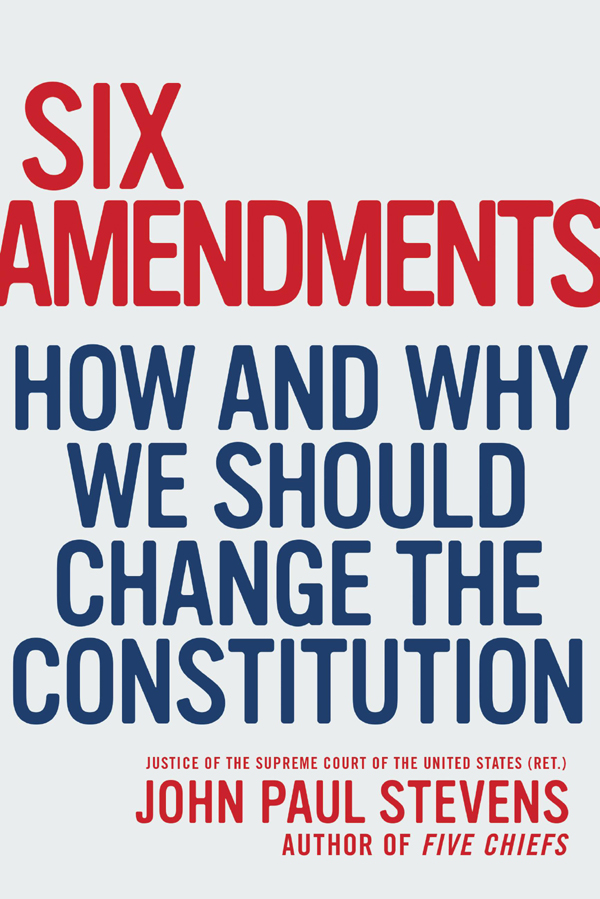In accordance with the U.S. Copyright Act of 1976, the scanning, uploading, and electronic sharing of any part of this book without the permission of the publisher constitutes unlawful piracy and theft of the authors intellectual property. If you would like to use material from the book (other than for review purposes), prior written permission must be obtained by contacting the publisher at permissions@hbgusa.com. Thank you for your support of the authors rights.

A ccording to its preamble, the Constitution of the United States was established by the Peoplenot by the statesin Order to form a more perfect Union, establish Justice, insure domestic Tranquility, provide for the common defence, promote the general Welfare, and secure the Blessings of Liberty to ourselves and our Posterity As Abraham Lincoln perceptively observed, it created a government of the people, by the people, and for the people.
The Union created by the Constitution was unquestionably more perfect than the one formed by the states when they signed the Articles of Confederation. Under the Articles there was no central government authorized to resolve disputes among individual citizens, to tax or to impose any direct obligations on individuals, or to regulate commerce between or among the separate states. Like a treaty among multiple sovereigns, the Articles defined obligations that the former colonies assumed in their dealings with one another.
Despite the fact that the Constitution was far more perfect than its predecessor, important imperfections in its text were the product of compromises that were certain to require that changes be made in the future. Differing interests of large states and smaller states, as one example, and of slave states and free states, as another, required that the framers make significant concessions to secure agreement. Best known is the compromise that led to a bicameral legislature, with the Senate providing equal representation for all states and the House providing greater representation for the larger states. Less well known is the compromise that granted slave states two special benefits. Evidence of the importance of both of those compromises is found in Article V, which describes how the Constitution may be amended.
That article authorizes two methods of proposing new amendmentsby two-thirds of both houses of Congress or by a convention for proposing amendments called by the legislatures of two-thirds of the states; and two methods of ratifying amendmentsby the legislatures of three-fourths of the states, or by conventions in three-fourths of the states (this latter method has never been successfully used). Article V also prohibited two kinds of amendments. One of those prohibitionsthe total ban on any amendment that would deprive any state, without its consent, of its equal Suffrage in the Senatereveals that the framers viewed that body, rather than the executive or the judiciary, as the primary guardian of the sovereignty of the smaller states.
The second limitation on the power to amend the Constitution highlights the importance of the compromise that appeased the slave states. That limitation prohibited any amendment prior to 1808 that would allow Congress to regulate the importation of slaves. Article V did not, however, mention the bonus provided to the slave states in Article Is formula for granting them representation in Congress. Even though slaves were not allowed to vote in any state in the South, three-fifths of them were counted for the purpose of determining the size of a states congressional delegation and the number of its votes in the Electoral College. In 1800 that slave bonus gave Thomas Jefferson more than the eight votes that provided his margin of victory over John Adams in the Electoral College. Not only did that bonus determine the outcome of that presidential election, but it also affected the work of Congress in the ensuing years when the interests of slave states and free states differed.
The procedures for amending the Constitution set forth in Article V have been successfully employed only eighteen times during the nations history. On the first occasion, the ten amendments, often described as the Bill of Rights, were all adopted at once; they placed specific limits on the powers of the new central government. Thus, the First Amendment begins with the command that Congress shall make no law respecting an establishment of religion, the preamble to the Second Amendment states that a well regulated Militia [is] necessary to the security of a free State, and the Third Amendment protects homeowners from the quartering of soldiers in time of peace. The Fourth Amendment protects individuals from unreasonable searches and seizures. The Fifth Amendment, appropriately, includes five separate guarantees: (1) the right to indictment by a grand jury in felony or capital cases; (2) protection against self-incrimination or (3) double jeopardy; (4) the right not to be deprived of life, liberty, or property without due process of law; and (5) the right to just compensation when property is taken for public use. The Sixth Amendment protects the right to a prompt and public trial, the right to confront hostile witnesses, and the right to a lawyer. The Seventh Amendment protects the right to a jury trial in civil cases, and the Eighth Amendment prohibits excessive fines and cruel and unusual punishments. The Ninth Amendment provides that the enumeration of specific rights in the Constitution shall not be construed to deny or disparage others retained by the people. And the Tenth Amendment provides that the powers not delegated to the United States by the Constitution, nor prohibited by it to the States, are reserved to the States respectively, or to the people. It is undisputed that when they were adopted, the first ten amendments applied only to the federal government and placed no limits on the powers of the states.
Only two additional amendments were adopted prior to the Civil War. The Eleventh Amendment was a response to the Courts decision in February of 1793 to accept jurisdiction of an action against the state of Georgia brought by a citizen of South Carolina named Chisholm to recover the price of military supplies sold to the state during the Revolutionary War. The amendment precludes federal jurisdiction over cases against a state brought by citizens of another state. Some critics of the Chisholm decision, who believed that the common-law doctrine of sovereign immunity should have foreclosed the suit, have argued that the fact that the amendment was adopted so promptly proves that the Courts decision came as a shock to the nation, which believed that the framers had left intact the sovereign immunity of the states for these types of suits. In fact, however, the amendment that was ultimately adopted was not proposed until March 4, 1794, more than a year after the Chisholm case was decided, and more than eleven additional months elapsed before it was ratified. In contrast to that two-year deliberative process, the interval between the proposal on December 9, 1803, of the Twelfth Amendmentwhich significantly revised the Electoral College procedures used to elect the presidentand its ratification on June 15, 1804, was just a few days more than six months.
President Abraham Lincoln played a major role in persuading Congress to propose the Thirteenth Amendment on January 31, 1865. That amendment, which abolished slavery, was not ratified by the states until December 6, well after his assassination on Good Friday in 1865. The Fourteenth Amendment, which awarded citizenship to the former slaves, was opposed by President Andrew Johnson and not ratified until July 9, 1868. That amendment was immensely important, not only because it granted African Americans citizenship, but also because it imposed on the states a federal duty to govern impartially. It provided that no state may deprive any person of life, liberty, or property, without due process of law; nor deny to any person within its jurisdiction the equal protection of the laws.













